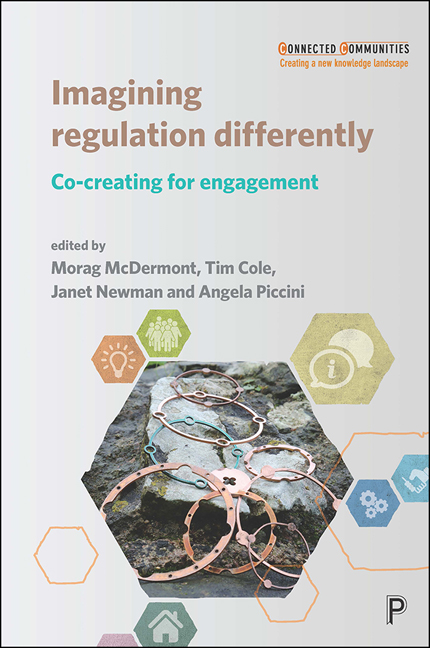Book contents
- Frontmatter
- Dedication
- Contents
- List of Figures, Tables and Boxes
- List of Abbreviations and Acronyms
- Notes on Contributors
- Acknowledgements
- Series Editors’ Foreword
- 1 Introduction: From the Regulation of Engagement to Regulating for Engagement
- 2 Co-Production as Experimentation: the Research Forum as Method
- Interlude: Community Researchers and Community Researcher Training
- 3 Beyond Prevent: Muslim Engagement in city Governance 49
- 4 Regulating for ‘care-ful’ knowledge Production: Researching Older People, Isolation and Loneliness
- 5 Who Gets to Decide what’s in my Fridge? Principles for Transforming the ‘Invisible Rules’ Shaping the Regulation of Food Habits in Urban Spaces
- 6 Life Chances: Thinking with art to Generate new Understandings of Low-Income Situations
- 7 The Making, Mapping and Mobilising in Merthyr Project: Young People, Research and arts Activisms in a Post-Industrial Place
- 8 Regulating Engagement Through Dissent
- 9 The role of Community Anchor Organisations in Regulating for Engagement in a Devolved Government Setting
- 10 Conclusion: Towards an Organic model of Regulating for Engagement
- Postscript: Engaging the University?
- References
- Index
3 - Beyond Prevent: Muslim Engagement in city Governance 49
Published online by Cambridge University Press: 03 March 2021
- Frontmatter
- Dedication
- Contents
- List of Figures, Tables and Boxes
- List of Abbreviations and Acronyms
- Notes on Contributors
- Acknowledgements
- Series Editors’ Foreword
- 1 Introduction: From the Regulation of Engagement to Regulating for Engagement
- 2 Co-Production as Experimentation: the Research Forum as Method
- Interlude: Community Researchers and Community Researcher Training
- 3 Beyond Prevent: Muslim Engagement in city Governance 49
- 4 Regulating for ‘care-ful’ knowledge Production: Researching Older People, Isolation and Loneliness
- 5 Who Gets to Decide what’s in my Fridge? Principles for Transforming the ‘Invisible Rules’ Shaping the Regulation of Food Habits in Urban Spaces
- 6 Life Chances: Thinking with art to Generate new Understandings of Low-Income Situations
- 7 The Making, Mapping and Mobilising in Merthyr Project: Young People, Research and arts Activisms in a Post-Industrial Place
- 8 Regulating Engagement Through Dissent
- 9 The role of Community Anchor Organisations in Regulating for Engagement in a Devolved Government Setting
- 10 Conclusion: Towards an Organic model of Regulating for Engagement
- Postscript: Engaging the University?
- References
- Index
Summary
Introduction
This chapter examines the Prevent strand of the government's counterterrorism strategy as a form of regulation, exploring its evolving local reception and implementation over the period from the New Labour to the Conservative-led Coalition governments. Launched in 2007 by New Labour as a community engagement, ‘hearts and minds’ approach to countering violent extremism, Prevent set out to partner and engage with Muslim communities to address the causes of radicalisation. In its 2007 guise, this involved locally focused Muslim community engagement projects. That approach was widely criticised for the limited offer of engagement that it seemed to present and was beset by allegations that Prevent was a means by which the government sought to achieve the mass surveillance of British Muslims (Kundnani, 2009). A body of academic literature emerged analysing Prevent as an attempt to ‘discipline’ British Muslims through interventions in Muslim civil society and religious organisation (Heath-Kelly, 2013). It is possible, then, to see Prevent as exemplary of the more problematic aspects of regulation – as a topdown, coercive, disciplinary regime. In this chapter, I analyse what the offer of engagement to Muslim communities through Prevent entailed and how, once instituted, it played out at the local level through a presentation of findings from the Productive Margins project on Muslim civic engagement in Bristol.
I argue that it is important to consider the effects of regulation in ways that go beyond consideration of the aims and logics of regulatory systems, to analysing carefully the nature and implications of regulation in practice. This requires taking account of the contexts in which regulation is introduced and the agency of various actors who come into contact with regulatory systems. Taking this approach also reveals the pluralistic nature of regulatory landscapes in which regulatory systems do not always or necessarily form a cohesive regulatory regime.
I analyse the regulatory implications of Prevent through three phases of the research project. The first phase was based on a case study of the implementation body for Prevent in Bristol – Building the Bridge. Drawing on the data from this case study, I explore Bristol's approach to implementing Prevent in practice.
- Type
- Chapter
- Information
- Imagining Regulation DifferentlyCo-creating for Engagement, pp. 49 - 66Publisher: Bristol University PressPrint publication year: 2020



